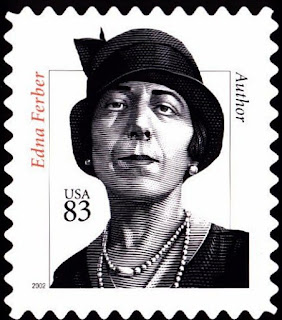When Edna Ferber (ed- nuh
fur-ber) was born in Kalamazoo on August 15, 1885 - life was harsh. Anxiety ran
high in the family home on South Park Street.
Why?
 The Ferbers were Jewish. Many people disapproved of
others practicing that religion. They hurled insults as the Ferbers went to
school, their synagogue (sin-uh-gog) or worked in their store.
The Ferbers were Jewish. Many people disapproved of
others practicing that religion. They hurled insults as the Ferbers went to
school, their synagogue (sin-uh-gog) or worked in their store.
The repeated bullying hurt everyone, especially Edna’s
father. He spoke with a Yiddish accent, was blind and in frail health. While
Edna was still young, he died.
With a childhood filled with heartache, Edna could have
become bitter and insecure. Instead, she picked up a pencil and paper
and began to write. Her first job was as
a newspaper reporter. Edna then wrote novels, short stories and plays based on
her observations of America’s working class. People of different colors and
backgrounds who met their ordeals with courage. Their struggles were balanced
with consideration for others.
Her book So Big won a Pulitzer (poo l-it-ser) Prize. Another popular novel, Show Boat, was transformed into a
Broadway musical. Years later, it became a movie as did her
other books Giant, Cimarron and Ice Palace.
Edna Ferber never forgot her
unhappy youth. She fought bigotry, not physically, but with written words. In 2002 the United States Postal Service
issued a Distinguished Americans postage stamp in her honor.









